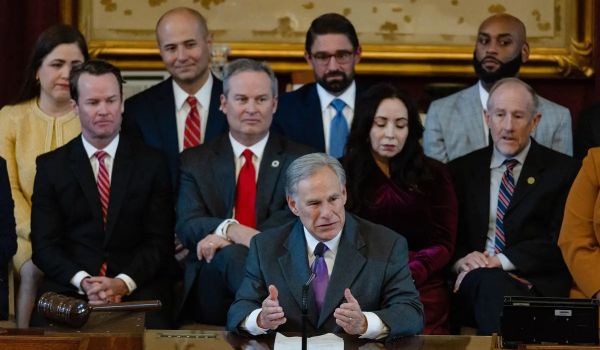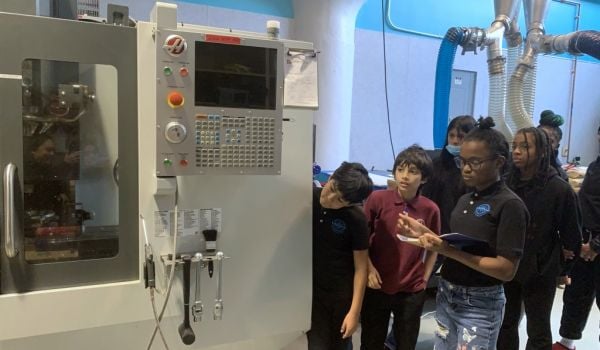Last year, San Antonio Mayor Julián Castro assembled a group he cheekily named the “Brainpower Task Force.” Its brainpower, he said, was to be channeled into finding a way to financially prime the city’s school systems to mold a truly competitive workforce.
The group came up with a unified plan: Invest in 4-year-olds.
Next Tuesday, San Antonians will vote on a measure that proposes to raise the city’s sales tax by an eighth of a cent, or about $7.81 per year for the average resident, to fund an eight-year pilot preschool program aimed at creating a game plan to bring city-sponsored early childhood education to at-risk children.
The payoff for a city like San Antonio, with its high poverty low high school graduation rates, could be huge. Those working in early childhood education point to two experiments held in the 1960s and 1970s, one in North Carolina and the other in Ypsilanti, Mich., concluding that at-risk children who attend good preschools have a better chance at being better educated, making more money and even avoiding teen pregnancy than counterparts who didn’t go through preschool.
“We know that pre-K and student loans aren’t charity,” Castro said in his keynote speech at this year’s Democratic National Convention. “They’re a smart investment in a workforce that can fill and create the jobs of tomorrow. We’re investing in our young minds today to be competitive in the global economy tomorrow.”
San Antonio’s investment comes in the form of four new centers that would educate 1,000 4-year-olds per year. A vast majority of these children — 90 percent — would be picked through a lottery system from the same pool of low-income children now eligible for federally funded Head Start programs. The remaining 10 percent would pay sliding-scale tuitions. The centers will be strategically located throughout the city to make sure that a broad cross-section of the city’s 20,000 4-year-olds are served, and that a good portion of the 5,700 4-year-olds that are eligible for state-funded preschool can access the schools.
The new schools would guarantee a full day of learning and a higher ratio of teachers to students than is typical in Head Start classrooms.
“Generic Head Start doesn’t have the same effect as high-quality preschool,” said Lori Taylor, an economics professor and education policy expert at Texas A&M University. “The centers would not only provide services, but they would be models to help learn what is effective in San Antonio.”
If the measure passes, a detailed planning process of the schools and curriculum comes next, city officials say. A CEO for the program would be chosen, the city would search for school sites and a new campaign would begin appealing to parents to enter their child in a lottery to attend the schools. City officials say the schools will study curriculum approaches, determine best practices and educate teachers who would fan out to preschools throughout the city and beyond.
Between the four new centers and others that would adopt their methods using grant provided by the city, the Castro administration hopes to reach 90 percent of the city’s preschool-aged children.
“Model centers will be hubs for training, thus driving quality improvements across the board in neighborhood schools and with both public and private providers,” said Jeanne Russell, education policy adviser to Castro.
The plan has faced criticism. The conservative Heartland Institute counts 678 existing preschools in the city run variously by school districts, nonprofits and for-profit groups. Those schools vary considerably by approach, geography and quality, but if there are thousands of city youngsters who aren’t in full-day preschools, its because of parent choice, not a lack of options, said Heartland public policy consultant Jeff Judson.
“There’s no shortage of supply,” Judson said. “I’m sure the model centers are going to be teaching kids adequately. But is the city going to be offering something substantially different than what is in the marketplace? I would say no.”
There’s also the question of what these “high-quality” model centers would actually do differently in the classroom.
“Nobody has exactly articulated what the curriculum is going to be,” Taylor said. “If they are not going to be providing high-quality Pre-K, this is going to be an extremely expensive form of daycare.”
Those who run existing preschools in the city would also keep their eyes on what happens at these schools.
“What we hope is that they are going to use a curriculum that is developmentally appropriate, not necessarily geared toward testing, and not watered down,” said Mary Stanchak, director of the Discovery School of San Antonio.
Early childhood education has gained increased attention in policy circles in recent years. Since 2000, the Chicago-based Ounce of Prevention Fund opened its first Educare Center, a multimillion-dollar, state-of-the-art school specifically aimed at giving a few hundred low-income and at-risk children a chance at free, high-quality preschool. Paid for through a combination of public and private funds, the Ounce will open its 18th school in Brooklyn next year.
Specifics and election results pending, those working in early childhood education say the San Antonio proposal has already proved innovative in including regular people in the policy process. On the funding side, sales tax adds to a financial arsenal that is largely limited to a few public programs and private backers such as the Buffett Early Childhood Fund, supporters say. And by promoting possible economic and community benefits of quality preschool to voters, be they parents or not, the initiative could drive demand for higher standards in preschools across the board.
“It is important to have a citywide campaign,” said Haven Ladd, a partner at a Boston-based education consultancy firm called The Parthenon Group. “The biggest objective of this is to break intergenerational poverty cycles. We are trying to, as much as anything, educate parents and this encourages as many parents as possible to think about what they want out of their child’s preschool.”

Tanveer Ali is a multimedia journalist based in Chicago. His work has been featured on the Chicago News Cooperative, WBEZ, WhoRunsGov.com and Mashable, as well as in publications including the Columbia Journalism Review and GOOD. Tanveer is a graduate of Columbia University and the Medill School of Journalism at Northwestern University.










